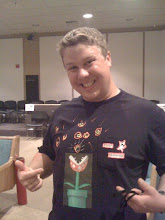 Today's question is, "What is Halloween? How did it get started? What does it represent? Can we celebrate it as Christians?" These are great questions, as Halloween falls on a Sunday this year. Halloween is an annual holiday where people dress up in costumes, trick or treat, carve jack-o-lanterns, and in most cases glorify death and the dead.
Today's question is, "What is Halloween? How did it get started? What does it represent? Can we celebrate it as Christians?" These are great questions, as Halloween falls on a Sunday this year. Halloween is an annual holiday where people dress up in costumes, trick or treat, carve jack-o-lanterns, and in most cases glorify death and the dead.We get the name Halloween from the old Scottish holiday "All-Hallows-Even" (evening). As you may know, eve generally means the night before something, think Christmas Eve (the night before Christmas). So Halloween was celebrated as the eve before All-Hallows or All Saints Day. All Saints Day originally started in 609 by the Pope Boniface IV dedicated the Pantheon in Rome and blessed it to "The Virgin and all the martyrs" and was actually in the Spring. Within 100 years All Saints Day was moved to November 1st and it celebrated & honored all the Roman Catholic saints.
Although many other countries celebrate holidays similar to Halloween which honor and remember the dead (Roman holiday Parentalia, or Mexican holiday "Day Of The Dead"), the one most linked with Halloween is the Irish holiday Samhain, which means "summer's end." The Celts believed that the boarder between this world and the next was think on this day, and that spirits, both harmless and harmful could escape. The families would welcome their harmless loved spirits and ward off the harmful ones. Costumes were worn to disguise people as harmful spirits so they would be left alone. It was also a holiday of gathering before winter, hence the trick-or-treating.
I am not one for Halloween. I don't like to be scared, and I certainly don't like to glorify death and darkness. The only thing I do like is the free candy. I think it's fine to do the fun stuff, but stay away from the dark, scary, things, that don't honor God. It's fine to dress up and go trick or treating, but you need to make sure things are in perspective. If the whole idea of Halloween is uncomfortable, celebrate All-Saints-Day. Dress up as an old saint. Do things to remember and honor them. What ever you do this weekend, remember the LORD God should be honored and praised above all. Be Safe and Happy All-Saints Day.





